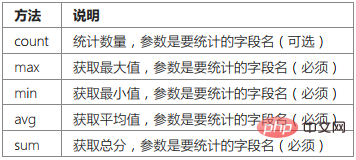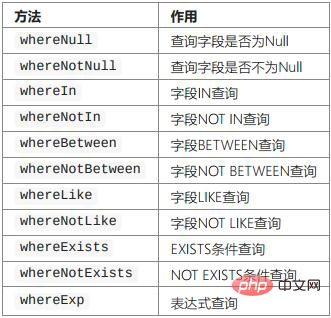 PHP Framework
PHP Framework
 ThinkPHP
ThinkPHP
 ThinkPHP database operation aggregation query, time query, advanced query
ThinkPHP database operation aggregation query, time query, advanced query
ThinkPHP database operation aggregation query, time query, advanced query
The following tutorial column will introduce you to the aggregation query, time query, and advanced query of ThinkPHP database operations. I hope it will be helpful to friends in need! Aggregation query
In applications, we often use some statistical data, such as all current users (or those who meet certain conditions) number, the maximum points of all users, the average score of users, etc. ThinkPHP provides a series of built-in methods for these statistical operations, including:
Usage example: Get the number of users:
Get the number of users:
Db::table('think_user')->count();
// 助手函数
db('user')->count();Or according to field statistics:
Db::table('think_user')->count('id');
// 助手函数
db('user')->count('id');Get the maximum points of users:
Db::table('think_user')->max('score');
// 助手函数
db('user')->max('score');Get the minimum points of users whose points are greater than 0:
Db::table('think_user')->where('score>0')->min('score');
// 助手函数
db('user')->where('score>0')->min('score');Get the user’s average points:
Db::table('think_user')->avg('score');
// 助手函数
db('user')->avg('score');Statistics on the user’s total score:
Db::table('think_user')->sum('score');
// 助手函数
db('user')->sum('score');Time comparison
##Use where method where
The method supports time comparison, for example: // 大于某个时间
where('create_time','> time','2016-1-1');
// 小于某个时间
where('create_time','<= time','2016-1-1');
// 时间区间查询
where('create_time','between time',['2015-1-1','2016-1-1']);
Use the whereTime method
The whereTime method provides quick query for date and time fields, the example is as follows: // 大于某个时间
db('user') ->whereTime('birthday', '>=', '1970-10-1') ->select();
// 小于某个时间
db('user') ->whereTime('birthday', '<', '2000-10-1') ->select();
// 时间区间查询
db('user') ->whereTime('birthday', 'between', ['1970-10-1', '2000-10-1']) ->select();
// 不在某个时间区间
db('user') ->whereTime('birthday', 'not between', ['1970-10-1', '2000-10-1']) ->select();
Time expression
also provides more convenient time expression query, for example: // 获取今天的博客
db('blog') ->whereTime('create_time', 'today') ->select();
// 获取昨天的博客
db('blog') ->whereTime('create_time', 'yesterday') ->select();
// 获取本周的博客
db('blog') ->whereTime('create_time', 'week') ->select();
// 获取上周的博客
db('blog') ->whereTime('create_time', 'last week') ->select();
// 获取本月的博客
db('blog') ->whereTime('create_time', 'month') ->select();
// 获取上月的博客
db('blog') ->whereTime('create_time', 'last month') ->select();
// 获取今年的博客
db('blog') ->whereTime('create_time', 'year') ->select();
// 获取去年的博客
db('blog') ->whereTime('create_time', 'last year') ->select();
// 获取今天的博客
db('blog') ->whereTime('create_time', 'd') ->select();
// 获取本周的博客
db('blog') ->whereTime('create_time', 'w') ->select();
// 获取本月的博客
db('blog') ->whereTime('create_time', 'm') ->select();
// 获取今年的博客
db('blog') ->whereTime('create_time', 'y') ->select();// 查询两个小时内的博客
db('blog') ->whereTime('create_time','2 hours') ->select();Advanced query
Quick query
Quick query method isA simplified way of writing the same query conditions in multiple fields
, which can further simplify the writing of query conditions. Use | to separate multiple fields to represent OR queries. Use & to separate AND query, you can implement the following query, for example:Db::table('think_user') ->where('name|title','like','thinkphp%') ->where('create_time&update_time','>',0) ->find();SELECT * FROM `think_user` WHERE ( `name` LIKE 'thinkphp%' OR `title` LIKE 'thinkphp%') AND ( `create_time` > 0 AND `update_time` > 0 ) LIMIT 1
Interval query
Interval query isA kind of multiple queries for the same field Simplified way of writing the query condition
, for example:Db::table('think_user') ->where('name',['like','thinkphp%'],['like','%thinkphp']) ->where('id',['>',0],['<>',10],'or') ->find();SELECT * FROM `think_user` WHERE ( `name` LIKE 'thinkphp%' AND `name` LIKE '%thinkphp') AND ( `id` > 0 OR `id` <> 10 ) LIMIT 1
The following query method is wrong:
Db::table('think_user') ->where('name',['like','thinkphp%'],['like','%thinkphp']) ->where('id',5,['<>',10],'or') ->find();Batch query
You can define batch conditional queries with multiple conditions, for example: Db::table('think_user'->'name' => ['like','thinkphp%'],
'title' => ['like','%thinkphp'],
'id' => ['>',0],
'status'=> 1->
SELECT * FROM `think_user` WHERE `name` LIKE 'thinkphp%' AND `title` LIKE '%thinkphp' AND `id` > 0 AND `status` = '1'
Closure Query
Db::table('think_user')->select(function($query){ $query->where('name','thinkphp') ->whereOr('id','>',10);
});SELECT * FROM `think_user` WHERE `name` = 'thinkphp' OR `id` > 10
$query = new \think\db\Query;$query->name('user') ->where('name','like','%think%') ->where('id','>',10) ->limit(10);
Db::select($query);If a Query object is used, any chain operations called before the select method will be invalid.
Mixed query
You can combine all the methods mentioned above to perform mixed query, for example:Db::table('think_user') ->where('name',['like','thinkphp%'],['like','%thinkphp']) ->where(function($query){ $query->where('id',['<',10],['>',100],'or');
}) ->select();
SELECT * FROM `think_user` WHERE ( `name` LIKE 'thinkphp%' AND `name` LIKE '%thinkphp') AND ( `id` < 10 or `id` > 100 )
String condition query
For some practical Complex queries can also be queried directly using native SQL statements, for example: Db::table('think_user') ->where('id > 0 AND name LIKE "thinkphp%"') ->select();
Db::table('think_user') ->where('id > :id AND name LIKE :name ',['id'=>0, 'name'=>'thinkphp%']) ->select();Db::table('think_user') ->where('name','like','%think%') ->where('name','like','%php%') ->where('id','in',[1,5,80,50]) ->where('id','>',10) ->find();V5.0.5 version has added a series of shortcut methods to simplify queries, including:

The above is the detailed content of ThinkPHP database operation aggregation query, time query, advanced query. For more information, please follow other related articles on the PHP Chinese website!

Hot AI Tools

Undresser.AI Undress
AI-powered app for creating realistic nude photos

AI Clothes Remover
Online AI tool for removing clothes from photos.

Undress AI Tool
Undress images for free

Clothoff.io
AI clothes remover

AI Hentai Generator
Generate AI Hentai for free.

Hot Article

Hot Tools

Notepad++7.3.1
Easy-to-use and free code editor

SublimeText3 Chinese version
Chinese version, very easy to use

Zend Studio 13.0.1
Powerful PHP integrated development environment

Dreamweaver CS6
Visual web development tools

SublimeText3 Mac version
God-level code editing software (SublimeText3)

Hot Topics
 1386
1386
 52
52
 How to run thinkphp project
Apr 09, 2024 pm 05:33 PM
How to run thinkphp project
Apr 09, 2024 pm 05:33 PM
To run the ThinkPHP project, you need to: install Composer; use Composer to create the project; enter the project directory and execute php bin/console serve; visit http://localhost:8000 to view the welcome page.
 There are several versions of thinkphp
Apr 09, 2024 pm 06:09 PM
There are several versions of thinkphp
Apr 09, 2024 pm 06:09 PM
ThinkPHP has multiple versions designed for different PHP versions. Major versions include 3.2, 5.0, 5.1, and 6.0, while minor versions are used to fix bugs and provide new features. The latest stable version is ThinkPHP 6.0.16. When choosing a version, consider the PHP version, feature requirements, and community support. It is recommended to use the latest stable version for best performance and support.
 How to run thinkphp
Apr 09, 2024 pm 05:39 PM
How to run thinkphp
Apr 09, 2024 pm 05:39 PM
Steps to run ThinkPHP Framework locally: Download and unzip ThinkPHP Framework to a local directory. Create a virtual host (optional) pointing to the ThinkPHP root directory. Configure database connection parameters. Start the web server. Initialize the ThinkPHP application. Access the ThinkPHP application URL and run it.
 Development suggestions: How to use the ThinkPHP framework to implement asynchronous tasks
Nov 22, 2023 pm 12:01 PM
Development suggestions: How to use the ThinkPHP framework to implement asynchronous tasks
Nov 22, 2023 pm 12:01 PM
"Development Suggestions: How to Use the ThinkPHP Framework to Implement Asynchronous Tasks" With the rapid development of Internet technology, Web applications have increasingly higher requirements for handling a large number of concurrent requests and complex business logic. In order to improve system performance and user experience, developers often consider using asynchronous tasks to perform some time-consuming operations, such as sending emails, processing file uploads, generating reports, etc. In the field of PHP, the ThinkPHP framework, as a popular development framework, provides some convenient ways to implement asynchronous tasks.
 Which one is better, laravel or thinkphp?
Apr 09, 2024 pm 03:18 PM
Which one is better, laravel or thinkphp?
Apr 09, 2024 pm 03:18 PM
Performance comparison of Laravel and ThinkPHP frameworks: ThinkPHP generally performs better than Laravel, focusing on optimization and caching. Laravel performs well, but for complex applications, ThinkPHP may be a better fit.
 How to install thinkphp
Apr 09, 2024 pm 05:42 PM
How to install thinkphp
Apr 09, 2024 pm 05:42 PM
ThinkPHP installation steps: Prepare PHP, Composer, and MySQL environments. Create projects using Composer. Install the ThinkPHP framework and dependencies. Configure database connection. Generate application code. Launch the application and visit http://localhost:8000.
 How is the performance of thinkphp?
Apr 09, 2024 pm 05:24 PM
How is the performance of thinkphp?
Apr 09, 2024 pm 05:24 PM
ThinkPHP is a high-performance PHP framework with advantages such as caching mechanism, code optimization, parallel processing and database optimization. Official performance tests show that it can handle more than 10,000 requests per second and is widely used in large-scale websites and enterprise systems such as JD.com and Ctrip in actual applications.
 Development suggestions: How to use the ThinkPHP framework for API development
Nov 22, 2023 pm 05:18 PM
Development suggestions: How to use the ThinkPHP framework for API development
Nov 22, 2023 pm 05:18 PM
Development suggestions: How to use the ThinkPHP framework for API development. With the continuous development of the Internet, the importance of API (Application Programming Interface) has become increasingly prominent. API is a bridge for communication between different applications. It can realize data sharing, function calling and other operations, and provides developers with a relatively simple and fast development method. As an excellent PHP development framework, the ThinkPHP framework is efficient, scalable and easy to use.



